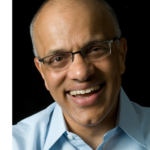Summary:
How does a person who makes $3.50 a day get a loan, a bank account, insurance, education? Atul Tandon and his organization have a genius for solving these seemingly intractable problems. But how to achieve scale? Sometimes the best thing is to let go.
Thuy

Atul Tandon
Thuy




